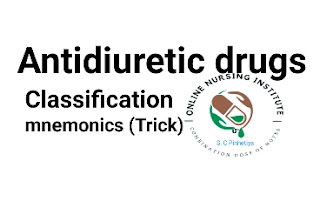What are Antidiuretic drugs
Antidiuretic drugs are the drug which are opposite work to the diuretic. It is
also known as antiaquaretics.
Antidiuretic are the drug that reduce urine out put (volume) by inhibiting
H2O elimination without affecting
the excretion of salt in the condition of diabetes insipidus (mostly).
In condition of dehydration ADH released and in the condition of over
hydration ADH inhibit.
Classification of Antidiuretic drugs
The antidiuretic drugs are classify in three types as
following..........
(A) Antidiuretic hormone
- Lypressin
- Terlipressin
- Desmopressin
(B) Thiazides diuretic
- Chlorthalidone
- Metolazone
- Xipamide
(C) Miscellaneous
- Chlorpropamide
- Carbamazepine
(A) Antidiuretic hormone :-
The antidiuretic
hormone are also known as vasopressin and 8 AVP (chemical name) which helps
to manage water in the body by kidney. It also helps in rise blood pressure.
Antidiuretic hormone is stored in posterior pituitary and synthesized in
hypothalamus.
It is synthetic polypeptide hormone which heve no effect on electrolytes
reabsorption.
Antidiuretic is contraindicated in the patient with hypertension, ischemic
heart disease and other allergic condition.
Antidiuretic hormone is administrated by any parenteral route and plasma half life is half hour.
Dose :- 10 unit
How do you test for antidiuretic hormone levels :- If you need to measure level of antidiuretic hormone then meet to your family doctor. Your doctor will done some test like blood test and urine test to measure the level of ADH.
(B) Thiazides diuretic :-
Thiazides are
also act as diuretics but thiazides paradoxically exert an antidiuretic
effect on diabetes insipidus in both pituitary origin and renal
diabetes.
Thiazides drugs is mostly used when ADH (antidiuretic hormone) is
ineffective.
(C) Miscellaneous :-
In miscellaneous agent the drug like carbamazepine is an anticonvulsant
medication used primarily in the treatment of epilepsy and neuropathic
pain. These drug also have antidiuretic action.
Mechanism of action of Antidiuretic drugs
(A) Mechanism of action of Antidiuretic hormone
Antidiuretic hormone increase water reabsorption by acting on the collecting
duct.
Antidiuretic hormone activates V2 receptor present on the cell membrane of the collecting duct and
increase water permeability of these cells.
Antidiuretic cause vasoconstriction amd rise blood pressure mediated by V1 receptor.
It also act on the smooth muscles to increase the peristalsis in the gut and
contract the uterus.
(B) Mechanism of action of Thiazides
Thiazides drugs block sodium and chloride in early distal tubule results in
decrease GFR rate and increase level of sodium in proximal tubule which
helps to decrease elimination of urine in diabetes condition.
(C) Mechanism of action of Miscellaneous
Miscellaneous agents work by increase ADH (antidiuretic hormone) action on
the renal tubules results in decrease elimination of urine.
What are the uses of antidiuretic hormone
(A) Uses of Antidiuretic hormone
- Diabetes insipidus
- Bed wetting
- Von willebrand's disease
- Bleeding esophageal varices
- Before abdominal radiography
- Hemophilia
(B) Uses of Thiazides
- Diabetes insipidus
- Congestive heart failure
- Edema
(C) Uses of Miscellaneous
- Antidiuresis
- Acute mania
- Trigeminal neuralgia
- Seizers
What are the adverse effects of Antidiuretic drugs
(A) Adverse effects of Antidiuretic hormone
- Nausea
- Abdominal cramps
- Increase blood pressure
- Myocardial ischemia
- Headache
(B) Adverse effects of Thiazides
- Hypervolemia
- Hypotension
- Over hydration
- Hyponatremia
- Weakness
- Fatigue
(C) Adverse effects of Miscellaneous
- Sedation
- Vertigo
- Dizziness
- Vomiting
- Diarrhoea
- Diplopia (double vision)
- Ataxia (impaired balance)
What is difference between diuretic and antidiuretic
| Diuretic | Antidiuretic |
|---|---|
| Diuretic helps to increase urine volume. | Antidiuretic helps to decrease urine volume. |
| Diuretic drugs most commonly used to treat high blood pressure. |
Antidiuretic drugs most commonly used to treat diabetes insipidus. |
| Side effect • Dehydration • Hypotension • Hyponatremia |
Side effect • Over hydration • Hypertension • Hypernatremia |
| Examples • Furosemide • Captopril • Losartan • Amlodipine |
Examples • Terlipressin • Carbamazepine • Desmopressin • Chlorpripamide |
Can diuretic and antidiuretic be given together
No acording to current study diuretic and antidiuretic can not given together because it both have opposite mechanism of action to towards. Diuretic is an agent which increase urine volume and antidiuretic is an agent which decrease urine volume. If both drugs are given together then it is possible to make a condition of kidney failure
What hormone is Antidiuretic
Vasopressin is a long acting endogenous hormone also called antidiuretic hormone which is helpful to regulate fluid volume. It is made by hypothalamus.
Is ADH inhibited by Alcohol
Yes alcohol is responsible for inhibiting ADH hormone (vasopressin) result in some chemical changes occur in kidney and cause you pee more.
What are some natural Antidiuretic
The some herbs is helpful to decrease urination. The Ayurvedic doctor use
these herbs to treat various disease condition that is characterized by
increase excretion of urine these natural herbs are
following.......................
(A) Licorice
The licorice is a herbs which has an of anti diuretic effect. The licorice is
a flowering plant which roots used as medicine. It is found in Asia and
europian country. Some time it is called as liquorice. Licorice is also
used to treat the conditions like skin inflammation and ulcer.
(B) Yohimbe
Yohimbe antidiuretic is an evergeen tree which is found in african country. It
is commonly used to treat erectile dysfunction and the bioavailability of
yohimbe is approximately 33 %. Yohimbe is also known as quebrachine.
(C) Valerian
Valerian is considered as antidiuretic and also used in the treatment of
generalized anxiety disorder. The other name of Valerian is garden
heliotrope.
Purchase PDF
See Also
..........................................................................................
I hope you like this article on Antidiuretic .if you have any query about Antidiuretic topic please comment on comment box because online nursing Institute is ready to always helping their students

0 Comments
Please don't enter any spam link in comment box